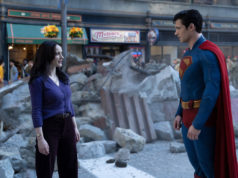Ah, the world of Bret Easton Ellis! The opulence! The decadence! The ’80s references! The world of beautiful overprivileged degenerates engaging in joyless sex amid piles and piles of cocaine! Ya gotta love it!
Well, actually you don’t. Ellis established himself as a literary enfant terrible in 1985 w ith his novel Less Than Zero. The world has changed a great deal since then, but Ellis has been reluctant to move on, setting many of his stories in the same decade and the same wealthy demi-monde and filling them with the same sybaritic characters who are too soulless to be likable, which wouldn’t matter so much if they were at least fun to be around. They’re not, which is probably why his novels might make you feel like burning your cash and wandering into the Alaskan wilderness.
ith his novel Less Than Zero. The world has changed a great deal since then, but Ellis has been reluctant to move on, setting many of his stories in the same decade and the same wealthy demi-monde and filling them with the same sybaritic characters who are too soulless to be likable, which wouldn’t matter so much if they were at least fun to be around. They’re not, which is probably why his novels might make you feel like burning your cash and wandering into the Alaskan wilderness.
On the other hand, the film adaptations of his novels have had a mixed record of success. They range from Mary Harron’s mordantly funny take on American Psycho in 2000 to Roger Avary’s actively loathsome Rules of Attraction in 2003. Marek Kaniev-ska’s 1987 film of Less Than Zero is notable only for starring Robert Downey Jr. before his off-screen life turned into a Bret Easton Ellis novel. The latest is Gregor Jordan’s The Informers, which opens this week. As Ellis adaptations go, this is probably the most mediocre and certainly the most tedious.
Set in 1983 Los Angeles, the film takes up a loosely gathered set of characters – calling their plotlines “stories” is being too generous. The nominal main character is Graham (Jon Foster), a bisexual drug dealer who’s engaging in threesomes with a music-video director named Martin (Austin Nichols) and Martin’s girlfriend, Christie (Amber Heard). Delicately arranged around them are Graham’s Hollywood-mogul dad (Billy Bob Thornton) who’s cheating on his drug-addicted estranged wife (Kim Basinger) with a local newscaster (Winona Ryder); a British rock star (Mel Raido) who’s so stoned that he can barely tell which city he’s in; and Martin’s apartment-building doorman (the late Brad Renfro) who’s pulled into a child-kidnapping scheme by his unsavory uncle (Mickey Rourke). Weirdly enough, the book’s subplot about teenage vampires has been entirely dropped from the movie. They probably wouldn’t have helped, anyway.
As it is, there are too many characters here. More of them should have been cut, though with Ellis co-writing the script, it’s no wonder that the filmmakers are guilty of being too faithful. The characters are barely developed – we can’t tell if Graham’s dad is having an affair because his wife is on drugs, or if she’s doing the drugs because he’s having the affair. We’re led to think that the rock star’s concert will draw all these characters into the same place, but that never pays off. The film runs only 98 minutes; surely there was room to add some detail.
Then again, even if there were more empathy in the script, it’s doubtful that Australian director Gregor Jordan could have brought it to the surface. He unrolls the movie at an unvarying slow pace, never finding a way to consistently inject humor or change the wearying tone of the piece. Perhaps he was trying to find a cinematic equivalent to the drone of Ellis’ prose. Jordan does his best work in the opening three minutes, evoking a party in dream-like hues before punctuating the scene with a sudden violent death. After that, we’re back to these characters’ neverending spiritual malaise. The ennui that sets in is so severe that you’ll find yourself staring at the décor of these houses in Malibu and Bel Air and wishing that the film’s hot naked young actors would quit stepping in front and blocking your view.
Naked or not, the actors look lost. Thornton and Foster seem to think that the way to play characters who’ve shut down their own emotions is to avoid making any facial expressions at all. The opposite problem affects Renfro, who filmed this part before his drug-related death in early 2008. Something’s all too clearly wrong with the actor, both in his sweaty bloated appearance and his amateurish performance, indicating the character’s nerves and weakness by rocking from side to side in every scene. The only one who does his resumé any good is Rourke, employing his usual cool reserve to strike a chilling note in his character’s casual attitude toward his crimes.
The movie ends with Graham leaving an AIDS-ravaged Christie on a beach, unable to say anything meaningful to her. By that point, The Informers has taken on the moralizing bent of a sententious religious sermon, only without a clue as to what its characters should be doing instead of screwing around and snorting coke. If you’re looking for a juicy saga of amoral rich people, chances are you’ll be better off with the next episode of Gossip Girl.











